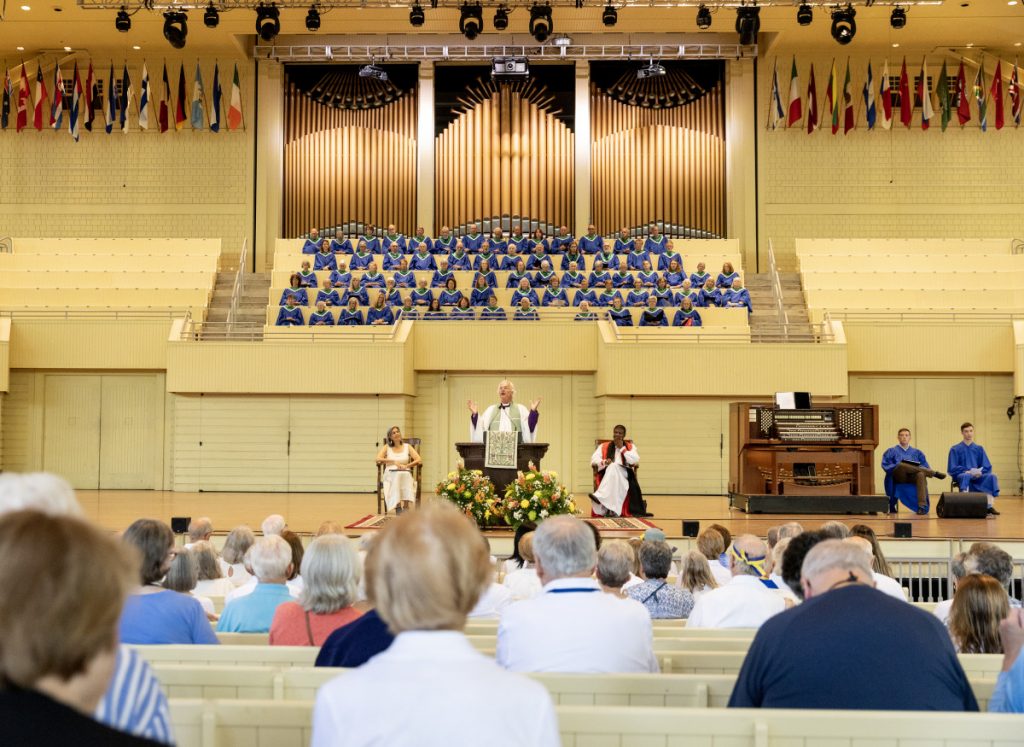
Column by Mary Lee Talbot
“There are lots of beloved old hymn standbys and scripture readings,” said the Very Rev. Samuel G. Candler at the 9:15 a.m. Wednesday morning service of worship in the Amphitheater. “Today’s reading in the Beatitudes is one.”
The title of Candler’s sermon was “Parish as the Practice of Vaccination and Blessing,” and the scripture text was Matthew 5:1-12.
He began the sermon singing, “ ‘I sing a song of the saints of God, patient and brave and true.’ Blessings to Muslims, ‘As-Salaam-Alaikum,’ to Jews, ‘shalom aleichem,’ to Christians, ‘Peace be with you,’ Blessings to Hindus, Buddhists, atheists and agnostics. ‘Dios te bendiga.’ These are all forms of blessing.”
Candler noted that not all stories in the Bible make sense scientifically. One story in the book of Numbers describes the camp of the Israelites overrun by snakes. To heal people who had been bitten, Moses erected a bronze image of a snake on a pole. He told the people to look at the bronze snake if they were bitten and they would be healed.
“This story made little sense until we developed vaccines and inoculations,” Candler said. “Vaccines help our bodies resist disease by putting a small dose of the disease in the body to fight infection. With a vaccine, one part of the body resists the infection so the entire body can resist the infection.”
He continued, “Then all the people around you don’t get sick. Communities are bodies, too, and parishes are bodies. Parishes are places meant to encounter spiritual diseases. These diseases live in each of us – greed, envy, apathy, evil. In a parish, we learn to acknowledge the disease and head it off before it grows larger.”
Jesus’ way of love shows us how to bear the pain and disease for the whole world, he said.
“Just as Moses lifted up the serpent on the pole, Jesus was lifted up to take on our pain,” he said. “This is not magic. Jesus bears our physical and spiritual maladies.”
Candler pointed to John 3:16-17 as an example of what God’s love looks like. “For God so loved the world that he gave his only Son, so that everyone who believes in him may not perish but may have eternal life. Indeed, God did not send the Son into the world to condemn the world, but in order that the world might be saved through him.”
There is no condemnation.
“This is the first principle I adopted in the pandemic. Condemnation would add to the stress,” Candler said. “In a world of condemnation, God’s love and a holy parish can make a difference.”
He continued, “For almost a century, we have been telling people that religion is not a heavenly insurance policy nor a police officer. We need police officers but parishes do not administer laws.”
Candler sees parishes as priests.
“I mean, everyone — all of us — are priests,” he said. “A priest is someone who bears the pain of another, endures the illnesses of the other for them so they and the world can be healed.”
Every time we bear the hurt of another, we are being a vaccine, he told the congregation. By sharing the burden, we are enabling the person, the body, the system to become healthy. “That is a miracle. When we help one another we are helping the whole world to be healthy just like a vaccine.”
The ministry of the parish is to bless, not condemn. “ ‘As-Salaam-Alaikum,’ ‘Shalom Aleichem,’ ‘Peace be with you,’ ” he said. When the Atlanta Peachtree Road 10K race was held on Sundays, many congregations could not meet, but his congregation went out to the street and blessed the runners and bystanders.
“We had 60,000 people visiting the parish that Sunday,” he said.
Blessing is the most powerful word in the Bible, from the beginning of creation when God blessed Adam and Eve through to Abraham. God told Abraham that he would bless him so that he and his descendents would be a family of blessing to the world. “Every child of Abraham is meant to be a blessing and every child of every faith is a child of Abraham.”
A faithful parish blesses, too, he added. Parishes have gotten into trouble through support of civil rights, women’s rights, LGBTQIA+ rights.
“To bless is to be in right relationship,” he said.
In the book of Revelation, John, the writer, looked and saw a multitude of people from all tribes and peoples singing a blessing to God.
“Heaven is a place of blessing. It takes practice to bless which is why we practice on earth,” Candler said. “Blessing is the most important thing we do in life, especially for our children. As parents we bless our children again and again.”
He continued, “If you want the person beside you to grow, bless them. They will learn how to bless and grow. May the Lord bless you and keep you. May the Lord make his face to shine upon you, and be gracious to you. May the Lord lift up his countenance upon you, and give you peace.”
The Rev. Luke Fodor, rector of St. Luke’s Episcopal Church in Jamestown and vicar of the Episcopal Chapel of the Good Shepherd in Chautauqua, presided. Melissa Spas, vice president for religion at Chautauqua Institution, read the scripture. The Motet Choir sang at the Chautauqua Literary and Scientific Circle Class of 2023 Recognition Day Ceremony. Nicholas Stigall, organ scholar, played the Massey Memorial Organ for the prelude, “Andante Religioso,” from Sonata No. 4 in B Flat, by Felix Mendelssohn. Stigall accompanied soloist Evan Katsefes for the anthem, “If with all your hearts,” from Elijah, by Felix Mendelssohn. The postlude was “Fugue in C Major, BWV 545,” by Johann Sebastian Bach. Support for this week’s chaplaincy and services is provided by the Samuel M. and Mary E. Hazlett Memorial Fund.




